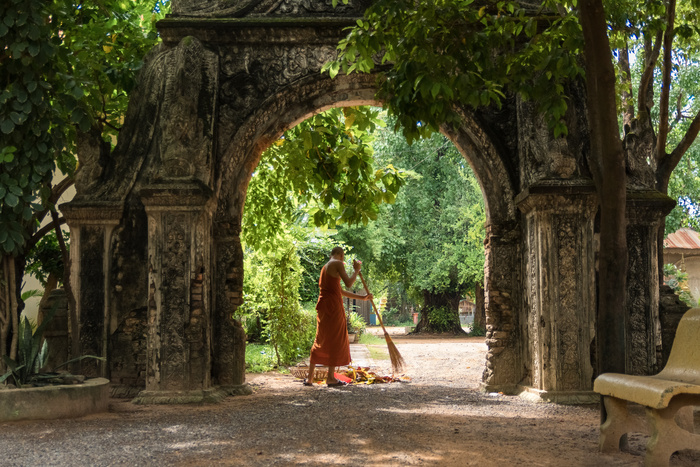Translated By Tara Lau
Did you know that since ancient times, many practitioners who were illiterate and unable to read scriptures have awakened to the ultimate truth of the universe? Among these saints are Huineng the Sixth Patriarch (638-713) and Cudapanthaka the Great One.
Huineng was an illiterate kitchen hand, but after enlightenment, he shared teachings and quotes from the classics, and eventually became a great master of Zen Buddhism. Cudapanthaka was Sakyamuni Buddha’s disciple. Illiterate and forgetful, his diligence and perseverance allow him to attain arhatship. The incredible deeds of the former are contained in the Sixth Patriarch Platform Sutra, but the story of the latter is little known. Here let me share with you how Cudapanthaka became enlightened:
The story goes that among Sakyamuni Buddha’s sangha were two brothers Mahapanthaka and Cudapanthaka. The latter, the younger of the two, was dull and slow. His memory was poor and what he learnt he soon forgot. Thus, after a few years, little progress was made in his cultivation.
One day after lunch, all the monks in the sangha walked to a bamboo grove for a nap. It was the height of summer with the sun beaming down like fire. The bhikkhus found its shade pleasant and restful, but Cudapanthaka alone was weeping.
Buddha happened to be walking by, and kindly consoled him. Cudapanthaka said, “World’s Great One. My elder brother and I took the vow at the same time to be monastics. My brother is smart and attained sota patti phala in no time. But I am stupid and I cannot even memorise a single verse. My brother is very disappointed. He asked me to leave the sangha to look after our elderly parents at home and not to waste time. I fear I will not have another opportunity to practice Buddhism in this life. That’s why I am sad. I beg Buddha to show mercy and bless me with your guidance!”
Buddha said, “You need not be sad, and neither do you need to leave the sangha. Let me give you one simple gatha to recite, ‘Sweep away the dirt’. You should keep chanting these four words every day”.
However, being slow and forgetful, Cudapanthaka could not remember it even though he tried. Feeling depressed he started to cry again. Buddha said to him, “Every morning, after you give the sangha’s clothes a good shake, you sweep away the dust and say ‘sweep away’. In the afternoon, when you clean up the bamboo house and remove rubbish, say ‘the dirt’. This way, you chant as your work, and you will not forget the gatha ‘Sweep away the dirt’”.
Cudapanthaka followed Buddha’s advice and kept chanting “Sweep away the dirt” whenever he was dusting, cleaning and sweeping the floor. The other bhikkhus often chanted with him to help him memorize.
More than a decade had passed. One morning, while the bhikkhus were meditating in the bamboo grove, Cudapanthaka was cleaning in their living quarters and kept muttering, “Sweep away the dirt”. Just then, the sun shone through the windows on the dust floating all around. He stared at it and his mind immediately went into Samadhi. Exiting the state a while later, he suddenly understood it all and said,
“There are two types of dust. The dust on the outside can be seen by the naked eye and easy to sweep away. The dust on the inside, that is, greed, anger and delusion, however, can only be seen by looking through your own mind. If you can’t remove the inner dust, you will be perpetually caught up in the cycle of samsara. Compassionate Buddha! I now get it! I have swept away my own inner dust”.
All of a sudden, over the top of Cudapanthaka’s head, a radiant glow of light shone straight into the depth of his heart. That is how he attained arahatta phala.
After enlightenment, naturally possessing all the world’s knowledge with an unimpeded eloquence, Cudapanthaka became one of Buddha’s sixteen disciples. Although he had iddhi-vidha, a supernormal power to instantly move anywhere unrestrained by time and space, he kept using his own mere strength to clean the dust for his fellow bhikkhus. Every day, he kept chanting the gatha Buddha gave him, “Sweep away the dirt”.

